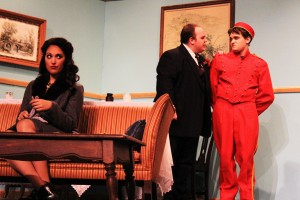Relationships fundamentally shape the human experience, allowing people to learn, develop and evolve. All College Theatre’s production of “Lend Me a Tenor,” which played from Oct. 5-8 in Kendall Hall, exemplified the power of relationships through Max, the meek assistant to a self-serving and obnoxious theatre manager, as he discovered the inner-strength needed to reach his dreams.
Max’s interactions with his boss, his idol and his long-time crush all had a major impact on his character’s development. His struggles to overcome self-doubt were largely based on his relationships with these people.
In search of success, respect and love, Max (played by senior English major Justin Mancini) begins as a sheltered man whose hopes are just that.
His boss, Saunders (senior psychology major John Eldis), is a humorously boisterous and demanding figure who refuses to see Max as anything other than a tool to be used and abused as necessary.
As Saunders prepares for the most important opera his theatre has ever hosted, Max is assigned the task of ensuring that the star of the show, Tito Merelli (freshman history major Aaron Harmaty), manages to get himself to the stage on time. Max’s admiration for Tito, as well as his desire to sing like him, leads to instant camaraderie between them.
Harmaty delivered in his role as Tito, as he displayed an indisputable confidence and warmth that almost tangibly rubbed off on Max.
Eldis was equally skillful as he acted in contrast to Tito as Saunders, whose character showed no regard for Max’s talent or emotions and was so perfectly obnoxious that the audience could not help but laugh.
Max’s interactions with Maggie (freshman early childhood education and mathematics double major Sam Chalek) represent the positive impact that confidence has on his character. Maggie becomes increasingly interested in Max as his confidence rises.

This comedy really takes off once Max and Saunders mistakenly come to believe that Tito has committed suicide. Saunders forces Max to assume Tito’s identity and consequently his role in the opera.
The result? Max nails the role, and in the process solidifies the confidence that Tito has given him.
Tito, however, is still very much alive, leading to mass confusion between the various characters in the play.
In the second act, this confusion leads to laugh after laugh as Tito is completely unaware that Max is impersonating him, and therefore misunderstands nearly every character he interacts with. Only the audience realized what was happening, as the underlying theme of relationships was coated with a hilarious set of complications.
The excellent chemistry of the cast allowed them to perform this complex play without a hitch. Each actor delivered the exact balance between thoughtfulness and comedic relief that their role called for, enabling the audience to absorb the show in a meaningful yet lighthearted manner.
Mancini excelled as he tied together the play that was so reliant on his character’s development. He convincingly and entertainingly portrayed the tale of an individual’s journey through life in search of confidence.






